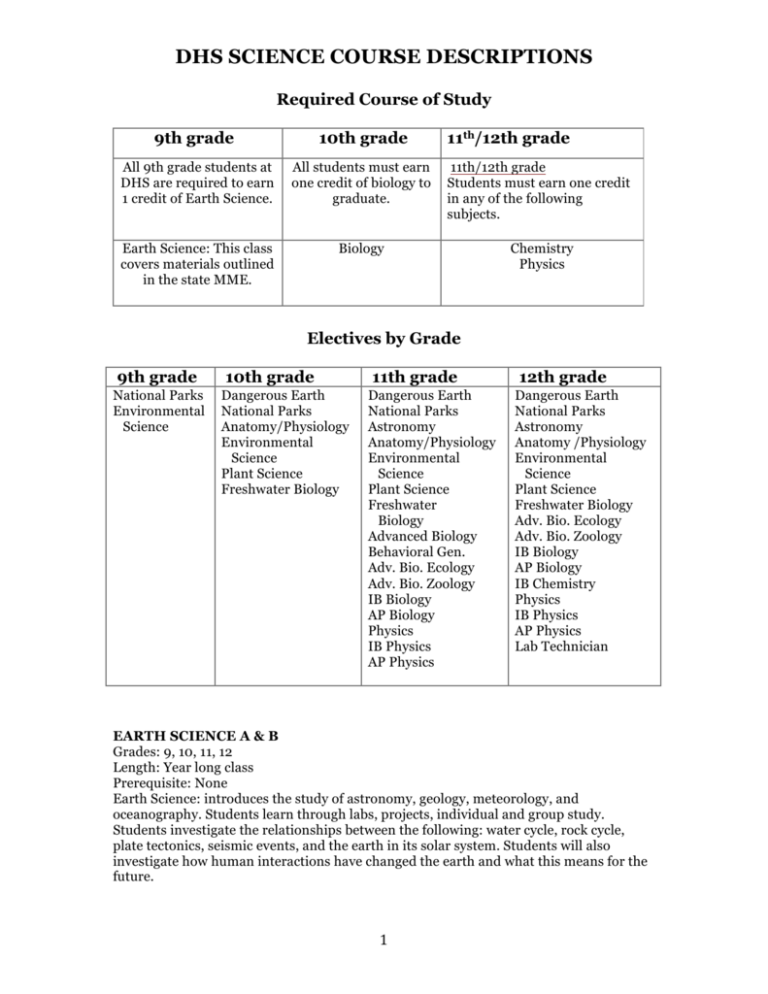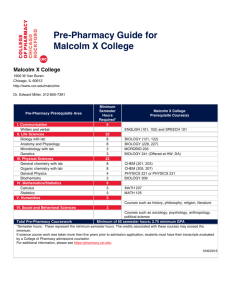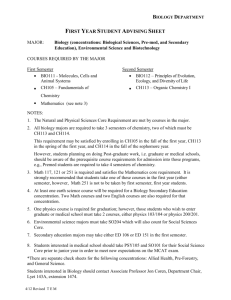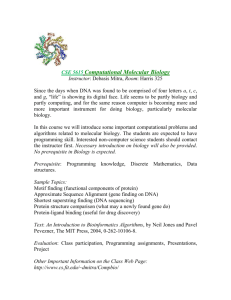dhs science course descriptions
advertisement

DHS SCIENCE COURSE DESCRIPTIONS Required Course of Study 9th grade 10th grade 11th/12th grade All 9th grade students at DHS are required to earn 1 credit of Earth Science. All students must earn one credit of biology to graduate. 11th/12th grade Students must earn one credit in any of the following subjects. Earth Science: This class covers materials outlined in the state MME. Biology Chemistry Physics Electives by Grade 9th grade National Parks Environmental Science 10th grade Dangerous Earth National Parks Anatomy/Physiology Environmental Science Plant Science Freshwater Biology 11th grade Dangerous Earth National Parks Astronomy Anatomy/Physiology Environmental Science Plant Science Freshwater Biology Advanced Biology Behavioral Gen. Adv. Bio. Ecology Adv. Bio. Zoology IB Biology AP Biology Physics IB Physics AP Physics 12th grade Dangerous Earth National Parks Astronomy Anatomy /Physiology Environmental Science Plant Science Freshwater Biology Adv. Bio. Ecology Adv. Bio. Zoology IB Biology AP Biology IB Chemistry Physics IB Physics AP Physics Lab Technician EARTH SCIENCE A & B Grades: 9, 10, 11, 12 Length: Year long class Prerequisite: None Earth Science: introduces the study of astronomy, geology, meteorology, and oceanography. Students learn through labs, projects, individual and group study. Students investigate the relationships between the following: water cycle, rock cycle, plate tectonics, seismic events, and the earth in its solar system. Students will also investigate how human interactions have changed the earth and what this means for the future. 1 DHS SCIENCE COURSE DESCRIPTIONS BIOLOGY A & B Grades: 10, 11, 12 Length: Year long class Required class Prerequisite: Required prerequisite ES Biology investigates biochemistry, cell theory, cell structure, cell function, photosynthesis, cellular respiration, cell reproduction, genetics, DNA technology, evolution theory, taxonomy, ecology, microorganisms, plants, invertebrates, vertebrates. Biology is recommended for students contemplating college. IB BIOLOGY SL/HL Grades: 11, 12 Length: SL One Year, HL Two Year Required: One biology course is required for graduation in the State of Michigan Prerequisite: Admittance into the IB Diploma Programme, B or better in Earth Science, Chemistry or Physics. International Baccalaureate Biology is a class offering you the analytical tools to learn about the biological sciences . Topics in the class are developed as problem solving issues where students will explore the role of a biologist through experimentation and problem solving skills. Every activity is meant to develop students as critical thinkers engaging in real world issues such as cloning, bio-terrorism, environmental protections, global perspectives, and most importantly the biologists role in these issues. This two year curriculum will challenge you to make educated decisions about our society and world in response to ecological issues. You will obtain the skills necessary to make educated decisions about policy and your role as a living citizen in our biological world. ADVANCED PLACEMENT BIOLOGY Grades: 11, 12 Length: Year long class Prerequisite: B or better in Accelerated Chemistry, Advanced Algebra, and World Literature & Composition or teacher permission. Advanced Placement Biology provides the equivalent of introductory college biology course taken by biology majors. The course includes rigorous information dissemination through presentations, discussions, laboratory experiences, research, intensive study, essay writing, and testing. Knowledge of chemistry, mathematical computation skills, and strong writing skills are a must. This two term course is designed primarily for students interested in obtaining college credits through the Advanced Placement Program sponsored by the College Board; however, the course is open to all interested students who meet the prerequisites. ADVANCED BIOLOGY: ZOOLOGY Grades 11-12 Length: One semester Prerequisite: C or better in Biology Advanced Biology gives the student an opportunity for in-depth research and study of some specific biological concepts, uses the inquiry method in learning biological science and provides opportunity for use of scientific equipment. This lab oriented course will focus on taxonomy, comparative anatomy and structural adaptations and evolution of animals using virtual and real dissections, field studies and simulations to investigate the animal world. Essay writing, lab reports, research, mathematical models and discussions will be the tools for learning the information. 2 DHS SCIENCE COURSE DESCRIPTIONS CHEMISTRY A & B Grades: 11, 12 Length: Year long class Required Physics or Chemistry class for graduation Prerequisite: Algebra, C or better in Biology or permission of the teacher. Accelerated Chemistry is the study of how matter interacts and the characteristics of those interactions. Through laboratory experiments, class discussions, and math based problem-solving activities, students develop the ability to observe and measure changes in matter and draw logical conclusions leading to generalizations about the behavior of matter. This class provides the recommended High School Content Expectations in chemistry and is recommended for college bound students interested in science. AP Chemistry Grade: 11 or 12 Prerequisite: Earth Science & Biology Length: One full year The AP Chemistry course provides students with a college-level foundation to support future advanced course work in chemistry. Students cultivate their understanding of chemistry through inquiry-based investigations, as they explore topics such as: atomic structure, intermolecular forces and bonding, chemical reactions, kinetics, thermodynamics, and equilibrium. PHYSICS A & B Grades: 10, 11, 12 Length: One semester each Required Physics or Chemistry for graduation Prerequisite: Algebra C- or better or permission of the teacher. Physics A/B is a fundamental science about the nature of basic things such as motion, forces, matter, heat, magnetism, electricity, waves and light. This conceptual physics class, Physics A/B, enables students to build their understanding through exploration, develop their comprehension through demonstrations and thought-provoking questioning, and then apply what they have learned through inquiry based activities. This course is designed to meet all the requirements for high school Physics. It is a good alternative for students who do not plan to pursue a study in precollege science courses. This course does not qualify as a senior math class. AP Physics B Grades: 11, 12 Length: One Year Required: physics or chemistry for graduation Prerequisite: pre-calculus (may be concurrently enrolled) AP Physics 1 is the equivalent to a first-semester college course in algebra-based physics. The course covers Newtonian mechanics (including rotational dynamics and angular momentum); work, energy, and power; and mechanical waves and sound. It will also introduce electric circuits. The ability to develop and use physics knowledge by applying it to the practice of scientific inquiry and reasoning is at the heart of the new physics courses and exams. Students will spend approximately 25% of their course time engaged in the practice of science through experimenting, analyzing, making conjectures and arguments, and solving problems in a collaborative setting, where they direct and monitor their progress toward an academic goal. 3 DHS SCIENCE COURSE DESCRIPTIONS IB Physics SL, IB Physics HL Prerequisite: Completion of Algebra II (Concurrent enrollment in pre-calculus & trig or HL Math 1, Math SL 1) Grade: 11, 12 Length: 1-2 years This course serves as the first course in the two-year IB HL physics curriculum or as the complete course for IB Physics SL. The course will include in-depth examination of themes involving laws of physics, experimental skills and the social and historical aspects of physics. Basic features of the natural world will be explained in terms of interactions between matter and energy. Students will hypothesize, design, and carry out investigations and theorize models. Topics will include measurement, mechanics, thermal physics, electricity, magnetism, fluid mechanics, waves and optics, atomic physics and nuclear physics. The course will be complemented with extensive laboratory work and individual and small-group research projects. Course objectives include advanced problem solving in physics, in-depth study of the basic principles of physics, improvement of critical thinking skills through problem solving, and sharpened laboratory skills. ENVIRONMENTAL STUDIES (Offered in school years ending with odd numbers) Grades: 10, 11, 12 Length: One semester Prerequisite: Biology Environmental Studies gives students an opportunity to investigate ecological relationships and structures, destruction of habitats, depletion of resources, pollution, alternative energy sources, current energy sources limitations, wildlife management, forestry and forestry management and invasive species, endangered species, energy relationships and conservation. Students will keep field journals, and do lab activities, simulations, field experiences, projects and tests and quizzes. INTRODUCTION TO ANATOMY AND PHYSIOLOGY (IAP) Grades: 10, 11, 12 Length: One semester Prerequisite: Biology required--concurrent or completed. IAP introduces the student to the anatomy and physiology of the human body. Each body system is highlighted in relation to structure, function, disease, and disorder. Organ and body systems are investigated through lab work, group work,dissection and class discussions. Students learn and use medical terminology. They are encouraged to apply concepts to their own lives. PLANT SCIENCE (Offered in school years ending with even numbers) Grades: 10, 11, 12 Length: One semester Prerequisite: Biology, Practical Biology or may be taken concurrently with Biology Plant Science teaches the structure, function and uses of plants in career orientations: agriculture, green housing, landscaping, and flower retailing. Students determine the needs of plants, where they grow, how to maintain their freshness and design, how to force flowers, and genetic manipulation. Class activities include: lecture, labs, projects, field trips, and collaborative group studies and discussions. FRESHWATER BIOLOGY (Offered in school years ending with odd 4 DHS SCIENCE COURSE DESCRIPTIONS numbers) Grades: 10, 11, 12 Length: One semester Prerequisite: Biology or may be taken concurrently with Biology Freshwater Biology develops awareness of the value of freshwater resources: ponds, lakes, streams, rivers, and wetlands. Students investigate the chemical nature of water environments, their living organisms, the impact of human uses of water environments and their adjacent watershed land masses, the effects of weather systems and seasons, and career opportunities in fields related to freshwater biology. Class activities include: lecture, labs, projects, field trips, and collaborative group studies and discussion DANGEROUS EARTH (Offered in school years ending with odd numbers) Grades: 10, 11, 12 Length: One semester Prerequisite: Earth Science Dangerous Earth begins with a brief introduction to fundamental geologic principles including the rock cycle and plate tectonics. The remainder of the course concentrates on the origin/causes, history and impacts of various natural hazards. ASTRONOMY (Offered in school years ending with odd numbers) Grades: 11, 12 Length: One semester Prerequisite: B or better in AGS II or Geometry Astronomy introduces the concepts of astronomy to students. The class consists on lecture and observations covering the concepts of astronomical history, light & telescopes, solar system, stars, galaxies, and the universe. Students will explore through computer activities, night time observations, and extra credit opportunities with local astronomy organizations. NATIONAL PARKS (Offered in school years ending with even numbers) Grades: 9, 10, 11, 12 Length: One semester Prerequisite: none Students will investigate the geologic processes that shape the Earths surface, using different National Parks as a focus for specific natural processes. SCIENCE LABORATORY TECHNICIAN Grade: 12 Length: One semester class Prerequisite: teacher recommendation and permission Science Laboratory Technician provides 12th grade students the opportunity to acquire practical lab skills for future careers in science and technology. Working under a “contract” with a science teacher, an technician learns correct practice for lab preparation, materials/equipment inventory, chemical preparation and disposal, calibration techniques for lab equipment, and storage and upkeep of lab tools. Technicians learn and use safe lab practices and proper responses to lab accidents. 5





